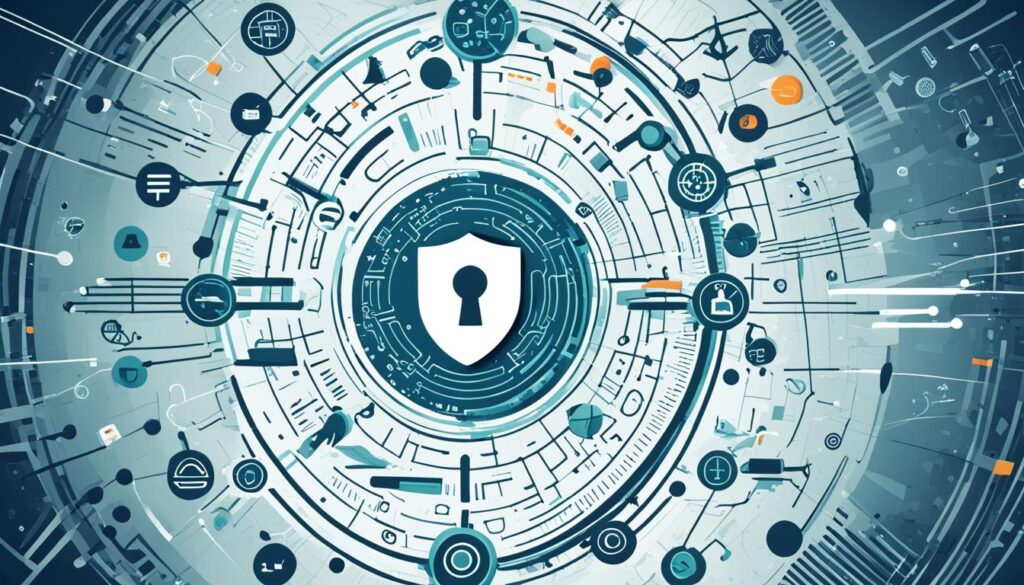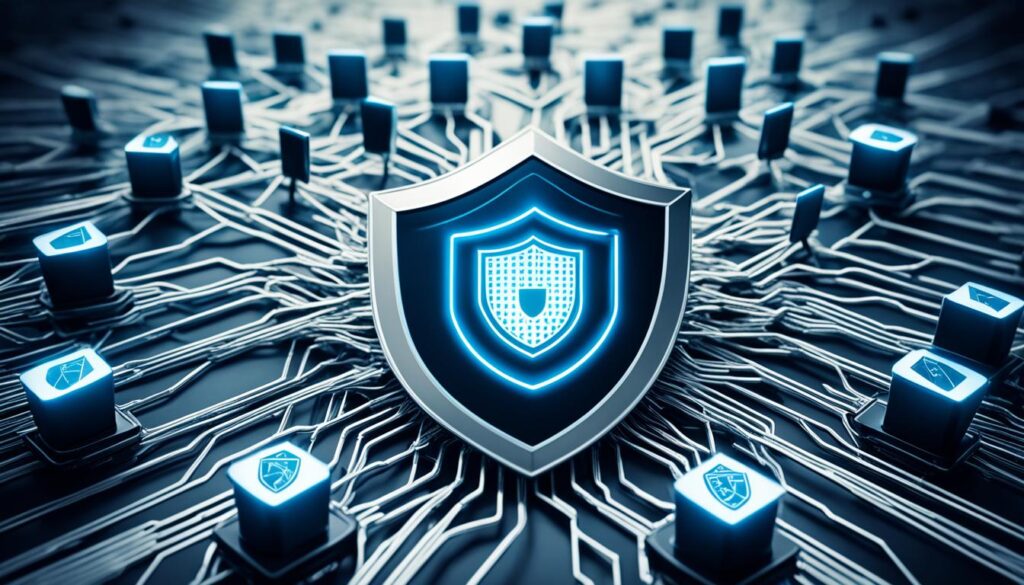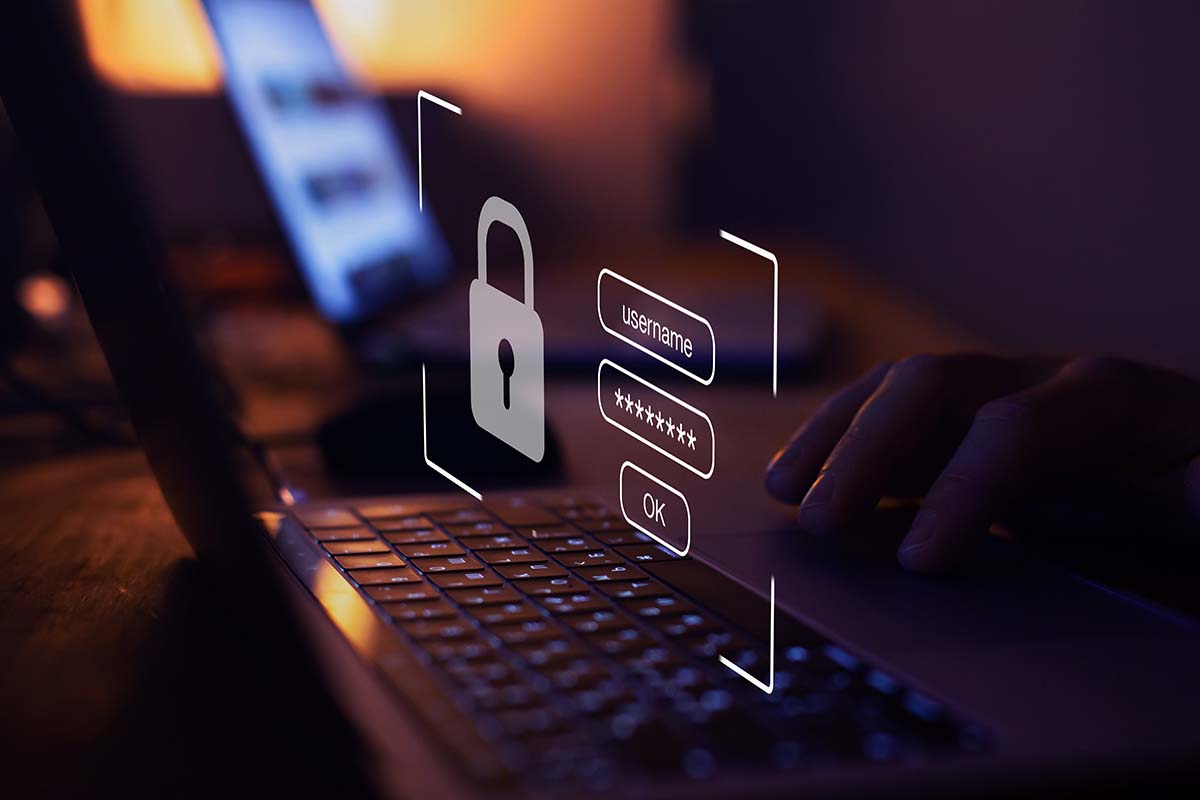What Are the Five Types of Cyber Security: Beyond the Basics
Cyber security is vital in today’s world. It’s all about keeping our digital world safe. Understanding the different types of cyber security helps protect critical information, critical infrastructure, and daily functions. We will look at the five main types of cyber security and see how they work together to ensure strong safety.
Are you ready to tackle ever-changing cyber risks and keep your digital stuff safe? Let’s find out the crucial types of cybersecurity that all companies should understand.

Key Takeaways
- Cyber security is essential for protecting sensitive data and critical infrastructure in the digital age.
- Understanding the five key types of cybersecurity is crucial for developing a comprehensive security strategy.
- The five types of cyber security are application security, data security, identity and access management, cloud security, and endpoint security.
- Each type of cyber security plays a vital role in defending against cyber threats and ensuring the overall security of an organization’s digital assets.
- Staying informed about the latest cybersecurity trends and best practices is crucial for businesses and individuals alike.
Understanding the Importance of Cyber Security
In today’s world, we’re all connected through technology. So, the need for cyber security is huge. More and more, we use digital tools to handle important information. But this also means we’re at a bigger risk from cyber threats. These threats can mess with our data, steal information, and even harm important systems we rely on.
The Growing Threat Landscape
The range of cyber threats is growing fast. There are many types of attacks, such as malware, phishing, ransomware, and DDoS. These attacks are aimed at all sorts of groups, no matter their size or what they do. They can cause money loss, hurt a group’s reputation, or stop services people need. That’s why fighting these threats is so important for any organization.
Protecting Sensitive Data and Systems
Everyone, from businesses to governments, must keep their data safe. It has strong defenses like firewalls, encryption, and controlling who can access what are key to keeping data safe and available when needed. Also, preparing for the worst with recovery and continuity plans is smart. They can reduce the harm of a cyber attack and help a group bounce back quickly.
Good cyber security is not just about one thing. It requires a mix of efforts, such as securing IoT and mobile devices and teaching people. By focusing on these key areas, groups can better shield their assets from changing threats.

Critical Infrastructure Security: Safeguarding Essential Systems
The security of important systems like power grids and transportation is vital against rising cyber threats. These systems are essential for modern life. Strong network security, access control measures, and disaster recovery plans are needed to keep them safe.
Securing Power Grids and Utilities
Power grids and utilities can be hit hard by cyber attacks. Attackers can cause power outages that disrupt daily life. To make them safer, we need to use the latest security protocols and access control mechanisms.
Preventing unauthorized access and cyber-attacks is crucial. It’s also important to stay informed about cyber threat intelligence. This, along with keeping strong incident response capabilities, helps to stop threats quickly.
Protecting Transportation Networks
Our communities rely on roads, railways, and aviation for their everyday functions. Protecting them from cyber attacks and malware is key to ensuring people and goods can move without interruption.
Protecting these systems means using operational security and careful security measures. We must also be ready with disaster recovery plans. These plans help us bounce back quickly if something goes wrong.
Good network security is key to a strong cybersecurity plan. It uses tools and tech to keep the network safe from hackers and other cyber dangers. Firewalls, IDS, VPNs, and secure protocols are important for this.
Firewalls and Intrusion Detection Systems
Firewalls are like gatekeepers for a network. They watch and control what comes in and out, stopping bad guys and malware. IDS helps, too, by watching for strange network activities and warning when it sees a threat.
Both these systems make the network safer. They prevent cybercriminals from harming your important data and systems.
Virtual Private Networks (VPNs)
In our connected world, VPNs are necessary. They make data transfer safe by creating secure links and keeping important information hidden from those who shouldn’t see it.
VPNs make your internet use private, protecting your online actions and information. They’re a key part of keeping networks safe.
Secure Communication Protocols
Using safe protocols is also vital. TLS and SSH are examples. They make sure data remains secret while traveling through the network.
These measures are crucial for protecting the network and keeping vital information secure.
With these tools in place, organizations can defend against many cyber threats. This way, they protect their digital assets and make sure their important work runs smoothly.
What are the five types of cyber security?
At ARK Solvers, we know cyber security can seem complex. But, focusing on these five types helps protect digital assets. These include application security, data security, identity and access management, cloud security, and endpoint security.
Application Security
Applications are key for many businesses today. Application security aims to protect them from attacks and unauthorized access. It involves safe coding, frequent checks for weaknesses, and strict access rules.
Data Security
Data security is vital for any organization. It’s about keeping sensitive info safe, whether it’s stored, sent, or used. Leaders use encryption, limited access, and backups to keep data secure.
Identity and Access Management
In a world with many cyber threats, IAM is crucial. It confirms who can use what in a system. With strong authentication and access rules, the chances of hacks and insider problems are lower.
Cloud Security
More firms use cloud technology, making strong cloud security necessary. It guards data, apps, and more in the cloud. Measures like encryption and monitoring ensure cloud resources stay safe and available.
Endpoint Security
As remote work grows, endpoint security is vital. It protects network access on devices like laptops and smartphones. Using antivirus and firewalls curb malware and keep data safe.
Knowing and using these five cyber security types helps firms stay secure. They protect digital assets and ensure operations continue despite cyber threats.
FAQ
What are the five types of cyber security?
There are five crucial types of cyber security:
Application Security protects software apps from risks and ensures safe development. Data Security keeps critical info safe from the wrong hands, online or offline.
Identity and Access Management monitors digital access. Cloud Security secures information and apps online. Endpoint Security looks after devices connecting to networks.
Why is cyber security important?
Cyber security protects our data, systems, and daily tasks online. It’s vital as threats keep changing.
With strong security, attacks and data theft can help us. We must keep up with cyber safety.
Read More: Why is Cyber Security Important?
How does network security fit into the overall cybersecurity strategy?
Network security is vital for a good cyber safety plan. It uses tools like firewalls to stop hackers and keep data safe.
This includes setting up safe connections, like VPNs. It’s all about protecting the paths data travels.
What is the role of critical infrastructure security in cyber security?
Essential infrastructure, like power and transport, must be safe online. Protecting these parts prevents big problems.
It needs many steps, like solid security plans and quick responses to threats. Cyber safety for key systems is a top priority.
How can organizations protect against cyber threats?
To defend against online dangers, companies should use many security methods. This includes:
– Strong rules for who can access what
– Putting special locks on digital info
– Checking for weak points often
– Being ready to act fast if there’s a problem
– Making sure all staff know how to stay safe online






